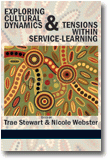
Exploring Cultural Dynamics and Tensions Within Service-Learning
Edited by:
Trae Stewart, University of Central Florida
Nicole Webster, Pennsylvania State University
Published 2011
Service-learning is an exciting pedagogy and field of study, offering insight into how academic study and community engagement blend to create social change. In its most traditional conceptualization, servicelearning activities typically manifest within communities where outside individuals address a need. Service learning is purported to have a transforming effect on individual student perspectives by providing students the opportunity to interact with people and enter into situations that allow students to test their predisposition towards others. However, the literature on the impact of service-learning on participants' acceptance of diversity and development of open-mindedness reports mixed outcomes.
The purpose of this book is to explore cultural tensions and dynamics within the field of service-learning. It is not meant to be an exhaustive review of the interplay between culture and service learning, but rather a starting point for an ongoing conversation about how this complex topic impacts the field. In 18 chapters, educators, students, and administrators investigate the cultural values of service-learning itself and the tensions created when this is at odds with the values of others within K-12 and higher education in the United States and abroad. Authors include community organization representatives, researchers, directors of offices of community engagement, university administrators, junior and senior faculty, and former service-learning undergraduate students. Submissions reflect a range of genres, including theoretical / conceptual pieces, position papers, case studies, and other traditional academic essays, challenging how students and community members are affected by the cultural tensions within service-learning engagement.
CONTENTS
Foreword, Paul C. Gorski. Preface, Trae Stewart & Nicole S. Webster. PART I: SUPPORTIVE FRAMEWORKS & CHALLENGING IDEOLOGIES/PARADIGMS. Engaging Culture: Ethnography as a Model for Service-Learning Practice, S. Ashley Kistler. Moving beyond the dominant: Service-learning as a culturally relevant pedagogy, Jennifer Gilbride-Brown. Challenging Privileged Paradigms through Service-learning: Exposing Dominant Ideology, Unlearning Deficit Thinking, and Debunking the Myth of Meritocracy, Annemarie Vaccaro. Relational Knowledge Production and the Dynamics of Difference: Exploring Cross-cultural Tensions in Service-learning Through Narrative, Nicholas S. Mariner, Jessica Nina Lester, Katharine Sprecher & Allison Daniel Anders. PART II: NOVEL APPROACHES, NOTED IMPACTS & NOTEWORTHY LESSONS. Diversity and Service-Learning: Finding Common Ground through Social Justice and Mindfulness, Catherine Mobley. Cultural Dynamics and Tensions within Service-learning in a Community Health Nursing Course, Ardith Sudduth, Evelyn Wills, & Jill Laroussini. The Effects of Service-Learning on White College Students’ Racial Attitudes: Implications for Achieving Better Outcomes, Christopher G. Wetzel, Lucy A. Waechter Webb, Anita A. Davis, & Maureen E. Miller. Teaching Lessons of the Holocaust through Service-Learning, Ruth T. Hannon & Joel P. Litvin. Teaching - A Job, A Lifestyle, A Story: Possibilities and Limitations of an Intergenerational Oral History Project, Kristi Richard Melancon. A Preliminary Evaluation of Cultural-Based Service-Learning: Characteristics of Cultural- and Academic-Based Service-Learners, Lori Simons, Lawrence Fehr, Nancy Hirshinger-Blank, Elizabeth Williams, Cassandra Dry, Courtney Carlin, Lisa Marie Curran, Jennifer Gensler, Shanay Rowe, & LaToya Wright. Revitalizing the Land Grant Mission in the South: One University’s Path to Civic Engagement via Community Schools, Robert F. Kronick, Nissa Dahlin-Brown, & D. Gavin Luter. Service-Learning Pedagogy: A Method for Improving the Education of Latino Students in Charter Schools, Nicole S. Webster & Centrice Martin. PART III: SUCCESSFUL & MISSING OPPORTUNITIES IN TEACHER & COUNSELOR EDUCATION. Preservice Teachers Explore Pedagogy & Service-Learning in a Place Called New Orleans East: Assumptions, Tensions and Innovation in a Post-Katrina Charter School. Margaret-Mary Sulentic Dowell. “Service is the rent we pay”: A tale of how three teacher educators studied our own practice through engaging pre-service teachers in a multicultural service-learning experience, Kristal T. Moore Clemons, Heather Coffey, & Sara B. Ewell. Exploring Cultural Dynamics of Self-Other Relations: University Faculty and Students Engage in Service-Learning with Refugees, Antonina Lukenchuk & Erika Barber. Gay, Lesbian, and Bisexual Issues in Counselor Education: The Potential of Service-Learning in the Development of Sensitive and Competent Mental Health Professionals, Trae Stewart & Ximena Mejia. PART IV: GLOBAL CONSIDERATIONS & LOCAL IMPLICATIONS. Intercultural Conflicts Within International Service-Learning: Reflections on Barbados, Norma Gaines-Hanks & Nyasha Grayman-Simpson. Whose project is it anyway? The case of Waste for Life, Argentina, Caroline Baillie, Eric Feinblatt, & Jens Kabo. About the Editors. About the Contributing Authors.
REVIEWS
"The book challenges educators to consider helping students identify and understand their social location and multiple priviledges (for example, race ethinicity, gender, education, sexual orientation) before entering into relationships with the communities they serve. It also challenges readers to understand the communities in which students engage, acknowledge the agency of the communities in which they work, and invite the communite into a collaborative learning process." Karen L Yonemoto Claremond McKenna College
-
Paperback978-1-61735-464-9
Web price: $45.04 (Reg. 52.99)
-
Hardcover978-1-61735-465-6
Web price: $80.74 (Reg. 94.99)
- eBook9781617354663

- EDU015000 - EDUCATION: Higher
- EDU020000 - EDUCATION: Multicultural Education
- EDU037000 - EDUCATION: Research
-
 (Re)Envisioning Social Studies Education Research
Current Epistemological and Methodological Expansions, Deconstructions, and Creations
(Re)Envisioning Social Studies Education Research
Current Epistemological and Methodological Expansions, Deconstructions, and Creations
-
 Affirming Identity, Advancing Belonging, and Amplifying Voice in Sororities and Fraternities
Affirming Identity, Advancing Belonging, and Amplifying Voice in Sororities and Fraternities
-
 Expanding the Vision of Faculty Learning Communities in Higher Education
Emerging Opportunities for Faculty to Engage Each Other in Learning, Teaching, and Support
Expanding the Vision of Faculty Learning Communities in Higher Education
Emerging Opportunities for Faculty to Engage Each Other in Learning, Teaching, and Support
-
 Faculty Learning Communities
Working Towards a More Equitable, Just, and Antiracist Future in Higher Education
Faculty Learning Communities
Working Towards a More Equitable, Just, and Antiracist Future in Higher Education
-
 Institutional Diversity in American Postsecondary Education
Institutional Diversity in American Postsecondary Education
-
 Promoting Equitable Classroom Practices in Higher Education
Approaches Beyond Curriculum
Promoting Equitable Classroom Practices in Higher Education
Approaches Beyond Curriculum
-
 The Handbook for Aspiring Higher Education Leaders
The Handbook for Aspiring Higher Education Leaders

